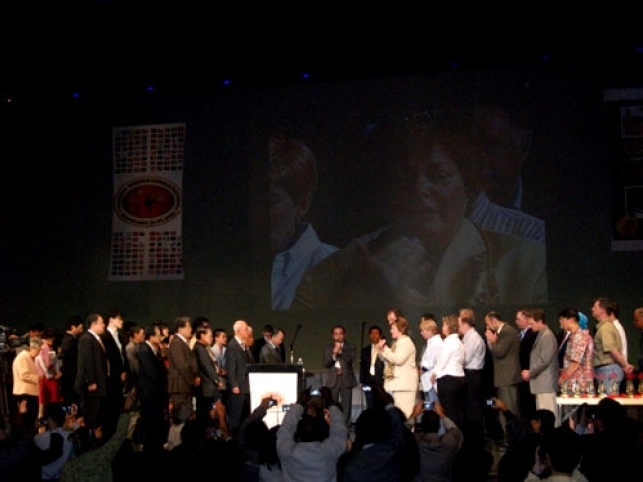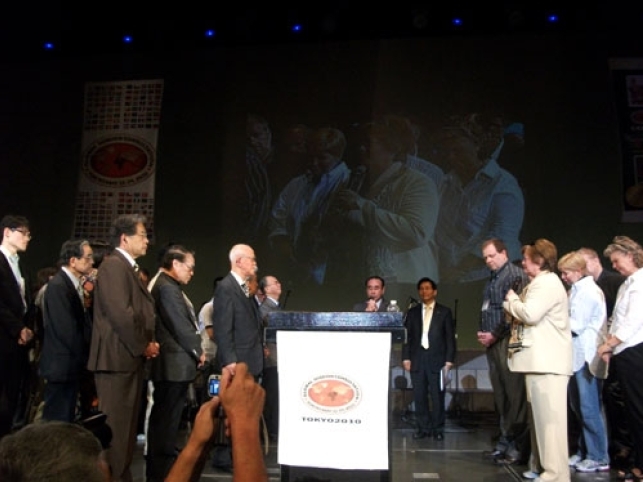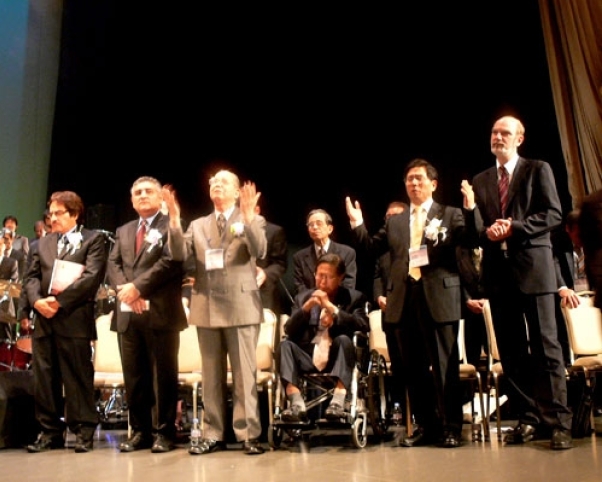A prominent Japanese church leader appealed for forgiveness on behalf of his country in the emotional final day of the Tokyo 2010 Global Missions Consultation on Friday.
Pastor Reiji Oyama, one of the founders of Japan Evangelical Association, requested time on the closing day of the four-day gathering to reconcile with fellow believers in countries that Japan previously occupied.
Standing on stage, Oyama expressed repentance to representatives of Asian nations that Japan previously colonized as well as countries that it hurt. He specifically mentioned the countries of Korea, Taiwan, Mongolia, and China.
“Japan repeatedly killed, murdered, stole, robbed, raped – just humiliated her neighbors,” Oyama said. “Therefore, as a Japanese, I really want to express my feelings of repentance. Not only do I want to repent to countries that Japan invaded and bombed and killed, but also as a Christian I want to really repent towards Israel.”
Oyama explained that Christians for a long time have hated Jewish people because they killed Jesus.
“The thing the Lord desires the most is that we get rid of those barriers and we come together and reconcile and become one,” the Japanese pastor said.
Mission leaders in attendance were asked to pray to remove anger and bitterness toward others from their heart. Japanese church leaders were specifically encouraged to extend a hand to mission leaders of Asian countries that Japan hurt while they prayed.
“Many times, us Christians look down upon non-Christians around us,” Oyama prayed. “In those times there is nothing about us that appeal to the unbelievers. Help us Lord to humble ourselves and to wash our neighbors’ feet.”
The public repentance and reconciliation by mission leaders was spurred by the reading of the Tokyo 2010 Declaration. At the end of the declaration is a confession on not valuing each other’s work and competing against one another. The mission leaders repented for their history of division and pledged to cooperate with one another in the future.
“We will respect all mission-engaging individuals and groups as special vessels for God’s glory, each endowed with abilities that extend His Kingdom in multiple ways,” the statement reads. “Finally, we recognize that finishing the task will demand effective cooperative efforts of the entire global body of believers.”
Besides repentance, the declaration affirms that mission is the “central theme” of the Bible and how God reveals Himself to a world “estranged” from Him. Fulfillment of the Great Commission has been and continues to be the responsibility of the Church for more than 2,000 years, it says.
It also notes how missions activity has shifted from one dominated by Western Christianity to one engaged mostly by Christians outside of the West.
The declaration says the responsibility of followers of Jesus is three-fold – to go (penetration) to those who have had little or no exposure to the gospel by various ways including in-person encounters, electronic communications, broadcasts, etc.; to baptize (consolidation) new believers into a relationship with Jesus and other believers; and to teach Christ-followers to obey (transformation) His commands leading to transformed lives.
“[A]s representatives of this generation’s global mission community, we pledge to obey the Great Commission,” the declaration states. “We covenant together to use all that God has entrusted to us in this obedience.”
Organizations that endorsed the Tokyo 2010 Declaration included the Lausanne Committee for World Evangelization, Muslim Unreached People’s Network, Nomadic People’s Network, Third World Missions Association, Japan Evangelical Association, and World Evangelical Alliance, among others.
The Tokyo 2010 conference marked the 100th anniversary of Edinburgh 1910, the first global missions conference. The Edinburgh meeting was significant because it sparked a new spirit of unity among Christians, inspired the Lausanne movement and other evangelical events, is the origin of the World Council of Churches, and marked the beginning of missions studies.
Organizers of Tokyo 2010 modeled the event after the Edinburgh meeting, with the difference being a more representative global missions body. More than 140 countries were represented at Tokyo 2010.










